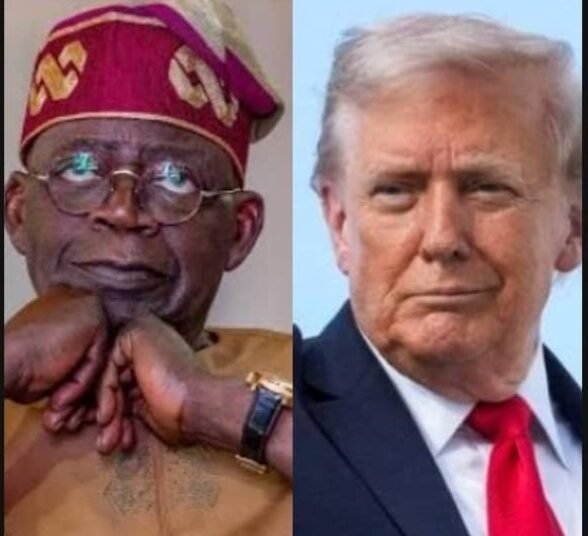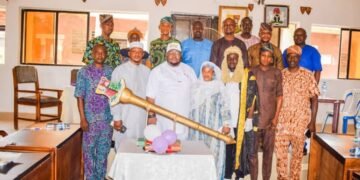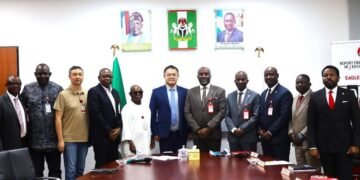In Homer’s epic poem, THE ODYSSEY, the concept of the ‘Greek gift’ was invented. The Trojan Horse became the undoing of Troy ending a decade’s war where many Greeks had perished, including the mighty Achilles. The Trojans accepted the Greek’s gift, and the rest, they say, is history.
In the past few days, both social and conventional media have been agoged with reactions to President Donald J. Trump’s threat to the Nigerian government to fix terrorism. In his words, “address the genocide against Christians in the North and Middle-belt or else the U.S will cut aids to the country and in addition, come into the country guns blazing in an attempt to flush out the terrorists”.
Sincerely speaking, the tweet made by the U.S. President sounded a bit comical to me, and so did many other commentaries that came after. Comical, not in a ridiculous sense but in a comedic sense.
This piece is not written to support or oppose any views but to lay down facts in the most succinct and objective of ways, thereby allowing for the independence of a balanced position.
In 2009, a terror group named Jama’at Ahlal-sunna li al-Da’wa wa al-Jihad (popular referred to as Boko-Haram) emerged with the aim of establishing Islamic rule across Nigeria. According to the group, Sharia was the only path to true progress, and any faith other than Islam was haram (forbidden).
Soon after, this group began launching viscous attacks against Christians and Christian places of worship. From singularly attacking Christians, their targets shifted to government institutions and facilities, and on November 28 2014, the greatest attack against their fellow Muslims was launched with the bombing and mass shooting of Jumat worshippers at the Kano central mosque. An attack where over 120 worshippers were killed with another 260 critically injured. The point made here is to underscore the fact that Boko-Haram, and in fact, all other extremist groups in Nigeria are not targeted at Christians alone, as earlier claimed, but after a more sinister plan of land grabbing with the colouration of economic, psychological, and socio-political domination of their conquered lands, and also with the intention of spreading all over the country.
From the northeast of Nigeria, activities of wanton killing and destruction perpetrated by terrorist spread to the north central region of the country, particularly Plateau and Benue States. What originally began as farmers/hearder clashes metamorphosed into full-blown villages and communities sacking where fulani invaders razed down entire communities, leaving hundreds dead or wounded while survivors were displaced with harrowing experiences in IDP camps. This wave of wanton destruction continued to happen in the North central, with the bloodiest in recent times occurring in Yelwata, Guma local Government area of Benue State on the night of 13th to 14th of June 2025.
According to Amnesty/CE/UN/NGO, over 200 people were grusomely massacred, several houses burnt to ashes, and about 3,000 people displaced and rendered homeless. In 2025 alone, Amnesty reported that more than 10,000 additional people had been displaced in Benue across several local governments ranging from Gwer west to Agatu, Ukum/Gbagir, logo, kwande, and Guma.
From the north-central, terrorism or, better still, banditry also found its way to the North West. The activities of bandits, kidnappers, and other criminal elements were consistently reported in Zamfara, Kaduna, Kebbi,Sokoto, Kano, and even Katsina, which was once regarded as the true home of hospitality as its State slogan depicts, and as i could also attest to considering how much i enjoyed the peace and serenity of the State during my days there-in as a Youth Corp member. Reuters.ng reports that as of 2025, approximately 2,456 people have been killed in the North-West region across multiple states. In addition to this, about 7,260 people, including school children and commuters on highways, have been abducted (kidnapped), where several millions of naira have been collected by these kidnappers, as ransome payments. Some parts of the south-west, South-east and south-south, have not been spared the atrocities of these terrorist and bandits.
Therefore, it is safe to say that the entire country has at one time or the other experienced the activities of bandits, terrorist and kidnappers. The intensity of attack is, however, what differs from region to region.
Late Gen. Sanni Abacha once said that “if any insurgency lasts for more than 24 hours, a government official has a hand in it.” This saying more or less amplifies the complexity of the terrorism/banditry/kidnapping problem in Nigeria. Nigeria is a country that is abundantly blessed with all manners of rich mineral resources. Apart from the vast arable land required for productive agriculture, there is virtually no region of the country that does not possess one valuable solid mineral or another. From the Iron Ore in Zamfara, Kogi, and Enugu, Gold in Kaduna, Kebbi and Osun, Lithium in Nasarawa, Kwara, Oyo, and the FCT, Bitumen in Ondo, Edo and Ogun, plus other industrial minerals like gypsum, kaolin and limestone that has deposits of over 1billion tonnes across many states of the country, Nigeria is sitting on an incredibly underutilised treasure worth billions of dollars. The government’s inability to adequately manage these vast potentials provide ample grounds for opportunistic scrambling, illegal mining, chaos, and its attendant conflicts. One can, therefore, boldly say that the chaos and violence camouflaged as terrorism and banditry is indeed a calculated campaign driven by not just Islamic extremism but also by land grabbing and occupation for the purpose of blood mineral extraction and illicit mining. Thus, a sophisticatedly armed radical Islamic fulani ethnic militia, often operating under political protection, carries out multiple killings, displacements, and kidnappings across the northeast, northcentral, and northwest, after which reports have revealed that foreign miners appear after the death and displacement of the indigenes to carry out their illicit business exploiting the lands of the displaced.
Amnesty International has also reported that Nigeria loses over 9 billion dollars annually to illicit mining of gold, tin, and lithium, with a significant portion estimated as 10% funding the violence and corruption. The report further revealed that the involvement of some government elements in this corruption is not in doubt as eye witness reports of survivors and satellite surveillance footages revealed the connivance of certain government elements. Some survivors have also severally claimed that they witness Helicopters in the middle of the night dropping weapons and ammunition for the bandits. A disclosure that was also corroborated by Professor Bolaji Akinyemi in an interview on African Stream earlier this year. So, it is right to say that violence and carnage are just a smokescreen and a catalyst to a far-reaching economic, psychological, and social-political agenda of certain influential elements in the country. This is part of the reason why the billions of naira that had been spent on security to equip the military to better fight insurgency haven’t yielded much results till date.
In addressing the threat of President Donald Trump, i would like to start by telling a little story about the 47th President of the United States and his previous anticidents. In January of 2018, at a News conference in the White House, President Trump referred to Haiti and some African countries that Nigeria very well belonged to, as Shithole countries who shouldn’t be accorded immigrant status in the U.S.
Furthermore, his government’s stern immigration policies and visa restrictions clearly reflect his hostile stance towards Africa and some other global South countries. In light of these, it is hard to understand where the genuine concern for the Nigerian Christian is coming from. More so when a U.S. congressman earlier this year revealed that the USAID played a significant role in the funding of Boko-Haram and other terrorist groups. A concern that was never mentioned when Late President Muhammadu Buhari visited the White House a few months after the Shithole saga and was praised by the same Trump for his valiant efforts in the fight against Boko-Haram, and ISWAP despite staggering reports of attacks and killings in the Northeast and Northcentral during this period.
Under the erudite scholarship of Professor Kunle Ajayi, I learned several years ago in one of our Politics of Global Economic Relations’ class that in world politics and global socio-economic relations, the overriding determinant of States’ decisions and actions is strategic interest. Altruism is hardly ever a factor. Present realities of Nigeria’s economic relations are fast approaching self-sufficiency, particularly in the oil sector, where Nigeria was once a major importer of finished petroleum products from the U.S. The Dangote refinery, having begun domestic refining and production of petroleum products, is fast taking over the market once dominated by imports from the U.S. This shift, no doubt, is taking off jobs from American oil workers, and this is no cheering news for the country’s oil conglomerates. Secondly, China had since substituted the United States as Nigeria’s foremost trading partner.
According to Nairametrix 2025, the volume of trade between Nigeria and China between 2023-2025 totals approximately 50 billion dollars compared to estimated figures of 30 billion dollars with the U.S. This paradigm shift no doubt wouldn’t be palatable to the U.S. nor her president, who happened to be a dogged businessman that hates no for an answer. So, from this point of view, it is not difficult to see where President Trump is coming from.
Be that as it may, I think Nigeria needs to employ shrewd diplomacy in dealing with the U.S. under a president like Donald Trump. Regardless of international law and conventions, the U.S. has severally proven itself to be one to take unilateral military action on countries against the rule of law and popular opinion in times past. So those hinging on Nigeria’s sovereignty as a deterrent to the U.S. are not good students of history.
What is, however, more important in all of these is that global attention is once again drawn to the horrible atrocities of these criminal elements in Nigeria. The country can not continue to act like it is normal headline news when people are slaughtered, uninhibited on a daily basis, and families and homes are torn apart. I believe this is an opportunity for the government to rejig the entire security architecture of the country with the needed political will to once and for all end these killings. Strategic partnership with the United States in this venture is not a bad idea. With its extensive experience in counter terrorism operations and access to sophisticated military technology and intelligence, the U.S. can easily assist in identifying and totally eradicating the major agency financiers and enablers of terrorism and banditry in the country. It is not rocket science that when the financing of terrorists ends, terrorism ceases to exist. However, this should be done only on the basis of a shared interest, mutual respect, trust, and understanding that is reflective of a healthy and balanced foreign policy relations. By prioritising constructive diplomacy, dialogue, and partnership, Nigeria can actually work with the United States in a strategic alliance to restore peace, security, and confidence across the nation. This is the way to go.
Olusegun Hassan, Ph.D
Public Policy Analyst and Social Commentator













